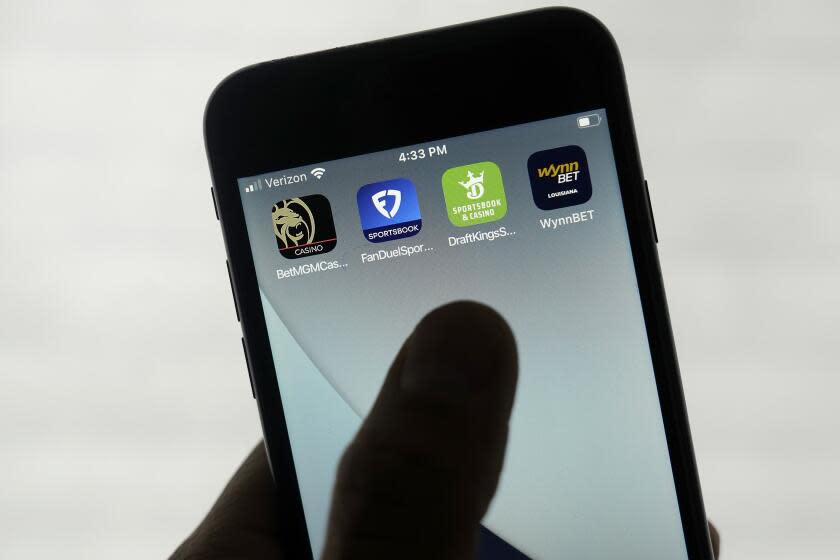Opinion: Why California should continue to hold the line against sports betting

- Oops!Something went wrong.Please try again later.
- Oops!Something went wrong.Please try again later.
- Oops!Something went wrong.Please try again later.
California is one of only 12 states where sports gambling remains illegal. We are down to just a dozen where you cannot turn your phone into a handheld version of the sportsbook at the Bellagio and bet your savings in an instant on whether LeBron James will get more or fewer than eight rebounds.
Americans wagered a record $119.84 billion on legal sports betting in 2023, but California should continue to hold the line and just say no to what has become the most popular game in town. The sports betting companies want nothing more than to check the state off their list of holdouts, but their wants are a world away from California’s needs.
There is an ugly underbelly to the sportsbooks’ mega-profits, the leagues' collusion and the states that collect taxes. It has been showing up particularly among the young.
A youth gambling epidemic has exploded since the Supreme Court, with urging from the NBA, decided in 2018 to allow states to legalize sports betting. For ensnared teenagers (it’s illegal for minors to bet but hard to enforce) and young people, gambling not just on the final score but pitch by pitch and shot by shot on a phone app is becoming an acute social crisis. To take just one state, in the five years since New Jersey legalized sports wagers, calls to the state’s gambling addict helpline tripled, driven by gamblers ages 25-34.
Read more: Hernández: Shohei Ohtani shows no hint of scandal distracting him in his Dodgers home debut
Sports betting is toxic. It is exploitative. And it should be treated in California like a barbarian at the Golden Gate.
Nowhere could this be clearer than in the case of Los Angeles Dodgers superstar Shohei Ohtani. You probably know the story: Ohtani’s onetime interpreter, Ippei Mizuhara, allegedly bet $4.5 million of Ohtani’s money with an illegal California bookie. (Mizuhara has not been charged; the allegations come from Ohtani and his lawyers.) There are suspicions, strongly denied, that Mizuhara was placing the bets on behalf of Ohtani. The FBI is investigating, and Major League Baseball has announced a full investigation too. All of this will no doubt cast a shadow over the entire Dodger season. (Say it ain't so, Sho!)
The fact that the bets were done with an illegal bookie are not an argument for legalization, in fact quite the opposite. The Ohtani scandal should compel us to consider how many more stories like this could happen if sports gambling were legal in California and what a pall it could cast across sport in the state. Legality means easier access and easier access means more temptation, perhaps especially for highly competitive athletes with excessive down time, big paychecks and phone addictions already in place.
If you want a window into how bad it can get, just check the sports news. Every week there is another story: Players suspect referees of being bought off so they make money signs with their fingers in front of the refs’ faces. Celtics star forward Jayson Tatum has spoken about fans howling at him for not covering their spreads. J.B. Bickerstaff, coach of the Cleveland Cavaliers, has reported receiving threats from unhappy gamblers targeting him and his family as well. A new wellspring of resentment and desperation has entered the fan-player relationship.
Read more: Shohei Ohtani leaves unanswered questions after blaming his interpreter in gambling scandal
Sports betting acolytes will protest. They claim legalization means a greater capacity to catch problem gamblers and players who break league rules by betting on their own sports. Besides, they say, players — or their entourages — will bet illegally if they can’t do it within the law.
That defense dramatically undersells how access to betting changes the dynamics: The same seductions of advertising and addictive algorithms that grab young people in general also lure athletes. And if the culture of sports betting creates a widespread assumption that the games are compromised by players’ bets, we are talking about the death of professional sport.
It is certainly true that sports betting is nothing new. It’s been part and parcel of pro sports since its beginnings more than a century ago, attaching itself like a barnacle to a boat. But the sheen of legalization has made the pairing much more dangerous: Gambling is the sclerotic beating heart of the new economy of sports.
Faced with fragmented audiences that have never had more options as to where to put their dollars, sports has turned to gambling to make up the difference. All the major U.S. leagues partner with sportsbooks in various ways. Some teams are opening bars in their stadiums with betting kiosks. They sell official league data — “the lifeblood of in-game betting,” according to an Associated Press report — to technology companies that supply it to sportsbooks.
Read more: The mysterious life — and questionable claims — of Shohei Ohtani's interpreter
This kind of canoodling is particularly damaging when we look at the struggling landscape of sports media. As newspaper sports sections and sports magazines strain to survive, they have as well turned to the gambling economy as a life raft, offering betting content and clickable promos for your first bet. The Associated Press signed FanDuel as its exclusive provider of sports odds for its sports coverage. ESPN has its own branded sportsbook. News sources we depend on to provide oversight and insight into sports, including the effects of gambling, are profiting from it.
Everything sports gambling touches sees its credibility damaged. Ask Ohtani.
California can be a bulwark against this rising scourge. Or it can be just another mark. There is not a third choice.
Dave Zirin is the sports editor of the Nation.
This story originally appeared in Los Angeles Times.

